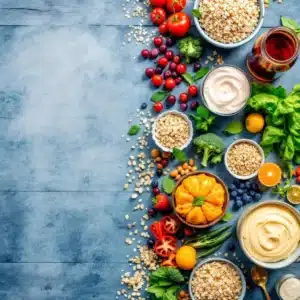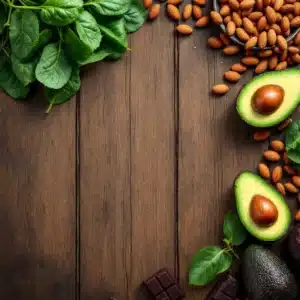Unlock the Secrets to Boosting Your Metabolism of Fat: Transform Your Body Today!

Have you ever wondered why some people can eat whatever they want without gaining weight, while others struggle to lose even a single pound? The secret lies in understanding and optimizing your metabolism.
Importance of Metabolism in Fat Loss
Metabolism is the process by which your body converts food into energy. It is crucial for fat loss because a faster metabolism can help you burn more calories, even when you’re not active. This means that the more efficiently your body can convert food into energy, the easier it will be to lose weight.
Common Misconceptions about Metabolism
One of the most common misconceptions is that a fast metabolism means you can eat anything and stay thin. While a fast metabolism can make it easier to lose weight, it doesn’t give you a free pass to indulge in unhealthy foods. Another misconception is that metabolism is static; in reality, it can be influenced by various factors, such as diet, exercise, and lifestyle.

What is Metabolism?
Definition of Metabolism
Metabolism refers to the chemical processes that occur in the body to maintain life. It includes how the body digests food, how it stores energy, and how it burns calories.
Types of Metabolism: Basal, Active, and Thermic
- Basal Metabolic Rate (BMR): The number of calories your body needs to perform basic functions at rest.
- Active Metabolism: The calories burned during physical activity.
- Thermic Effect of Food (TEF): The calories burned during digestion.
Factors Affecting Fat Metabolism
Age and Hormones
As you age, your metabolism naturally slows down. Hormones play a significant role; for example, thyroid hormones regulate metabolism, and imbalances can lead to weight gain.
Diet and Nutrition
What you eat can directly impact your metabolism. Consuming the right nutrients can boost your metabolic rate, while certain foods can slow it down.
Physical Activity and Exercise
Regular physical activity can significantly enhance your metabolism. Muscle tissue requires more energy than fat, so building muscle through strength training can increase your BMR.
Sleep and Stress Levels
Proper sleep is essential for a healthy metabolism. Chronic stress can lead to elevated cortisol levels, which can slow down metabolism and promote fat storage.
How to Boost Your Metabolism Naturally
The Role of Hydration
Staying hydrated is vital for a healthy metabolism. Drinking water can temporarily boost your metabolic rate and aid in fat loss.

Importance of Regular Physical Activity
Incorporating regular exercise, especially strength training and cardio, can enhance metabolism. Aim for at least 150 minutes of moderate exercise per week.
Benefits of High-Intensity Interval Training (HIIT)
HIIT involves short bursts of intense exercise followed by periods of rest. This type of training can significantly boost your metabolism and promote fat loss.
The Impact of Protein-Rich Diets
Protein requires more energy to digest than carbohydrates or fats, which can lead to a temporary increase in metabolism. Aim to include lean proteins in every meal.
See also: Burning Fat Fast: Myth vs. Reality of Rapid Weight Loss
Foods That Enhance Fat Metabolism
Top 10 Metabolism-Boosting Foods
- Green Tea: Rich in antioxidants, it can increase metabolic rate.
- Chili Peppers: Contains capsaicin, which can boost metabolism.
- Coffee: Caffeine can enhance fat oxidation and energy expenditure.
- Lean Proteins: Including chicken, fish, and tofu.
- Whole Grains: Foods like brown rice and quinoa can improve digestion.
- Berries: High in fiber and antioxidants, they can help regulate metabolism.
- Avocado: Healthy fats can aid in metabolism.
- Nuts and Seeds: Provide a balance of fat, protein, and fiber.
- Spinach: Rich in iron, it can support metabolic processes.
- Legumes: Beans and lentils offer protein and fiber.
Incorporating these Foods into Your Daily Diet
- Breakfast: Start with a protein-rich meal, like scrambled eggs with spinach and a side of berries.
- Lunch: Opt for a salad with grilled chicken, quinoa, and a sprinkle of nuts.
- Snacks: Include a small portion of chili pepper or a cup of green tea.
- Dinner: Choose a balanced plate with lean proteins, whole grains, and a side of vegetables.
Sample Meal Plan
- Monday:
- Breakfast: Oatmeal with berries
- Lunch: Grilled chicken salad
- Snack: Green tea
- Dinner: Baked salmon with quinoa
- Tuesday:
- Breakfast: Greek yogurt with nuts
- Lunch: Tofu stir-fry with vegetables
- Snack: Apple slices with peanut butter
- Dinner: Whole grain pasta with lean meat
- Wednesday:
- Breakfast: Smoothie with spinach and protein powder
- Lunch: Quinoa bowl with black beans and avocado
- Snack: Carrot sticks with hummus
- Dinner: Grilled shrimp with a side of broccoli
Supplements That May Help Boost Metabolism
Green Tea Extract
Green tea is rich in catechins, which can enhance fat burning. Look for supplements that provide a standardized extract.
Capsaicin (Chili Pepper Extract)
Capsaicin is known to increase metabolic rate and promote fat loss. It’s often found in thermogenic supplements.
Coffee and Caffeine
Caffeine can increase energy expenditure and help with fat oxidation. Moderation is key, as excessive caffeine can have negative effects.
Other Natural Supplements
- Conjugated Linoleic Acid (CLA): A type of fatty acid that may aid in fat loss.
- Citrus Aurantium: An extract that may boost metabolism and energy.
My Personal Journey with Metabolism
How I Discovered the Importance of Metabolism
Understanding metabolism transformed my approach to fitness and nutrition. I learned that it wasn’t just about calories in and calories out; it was about optimizing my body’s processes.
My Personal Strategies for Boosting Metabolism
I incorporated regular HIIT, focused on a protein-rich diet, and stayed hydrated. These strategies helped me see sustainable results.
Overcoming Challenges
I faced plateaus and moments of frustration, but by tweaking my approach, I was able to keep my metabolism active and continue losing fat.
Common Myths and Questions about Metabolism
Frequently Asked Questions
- How long does it take to see results?
- Results can vary, but with consistent effort, many see changes in 4-6 weeks.
- Can genetics affect my metabolism?
- Yes, genetics play a role, but lifestyle factors can still influence metabolism.
- Is it possible to speed up metabolism?
- Yes, through diet, exercise, and lifestyle changes.
- What should I do if my metabolism is slow?
- Focus on regular exercise, a balanced diet, and stress management.
- How do I maintain my metabolism after losing weight?
- Continue with a balanced diet, regular exercise, and monitor caloric intake.
Conclusion
Understanding and optimizing your metabolism is essential for effective fat loss. By incorporating the right foods, engaging in regular activity, and managing stress, you can transform your body and improve your overall health. Stay committed and make informed choices to see lasting results.


